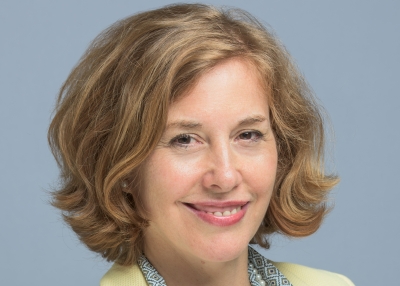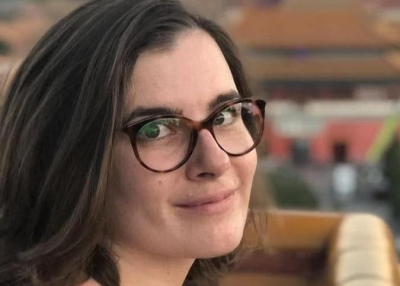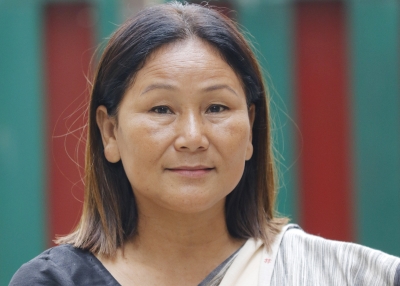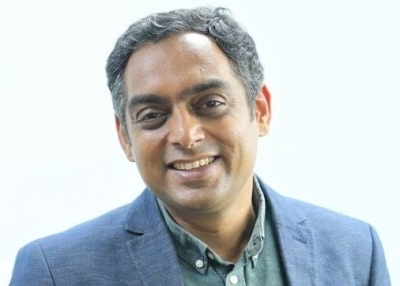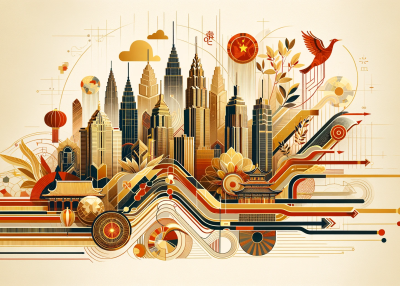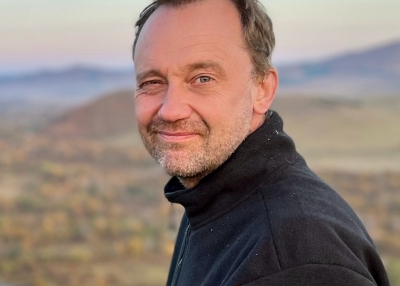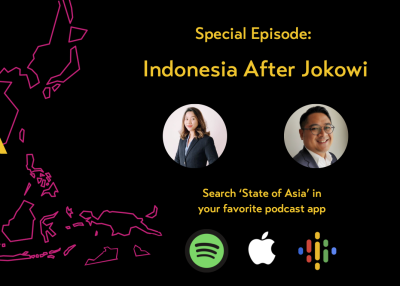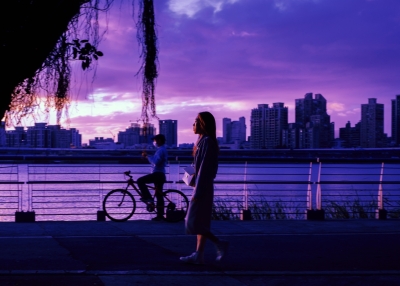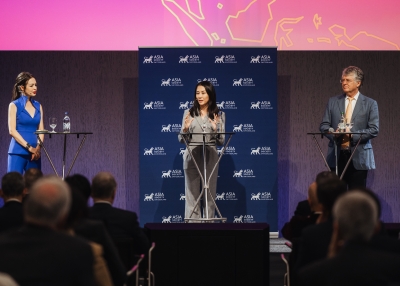State of Asia with Johan Nylander
On Mongolia's awakening – and folk metal
GUEST ON THIS EPISODE

Johan Nylander is an award-winning author and freelance China and Asia correspondent. His work is published by CNN, Forbes, Sweden’s leading business daily Dagens Industri, and many other international media outlets. His most recent book is The Wolf Economy Awakens – Mongolia’s Fight for Democracy, and a Green and Digital Future (Hong Kong University Press, 2023). Nylander is also the author of The Epic Split – Why ‘Made in China’ is going out of style (2020), a report from the frontline of the US-China trade war; and of Shenzhen Superstars – How China’s smartest city is challenging Silicon Valley (2017), which became an Amazon bestseller, as well as other books. He frequently gives speeches about Chinese business and tech trends, as well as on how to navigate a new world of trade war, decoupling and boycotts. He’s also founder of editing and publishing management firm One Hour Asia.
In this episode, we talk about how Mongolia, one of Asia's most unknown countries, is gearing up to be the continent's next economic miracle. And it's not just mining: the country has a vibrant tech start-up scene and is also making strides in the energy transition. All the while, this vibrant democracy of 3.3 million people, wedged between authoritarian giants China and Russia, manages to stay friendly with almost any country it interacts with. Johan's latest book is all about Mongolia's new awakening, based on his frequent travels there over the past two years.
STATE OF ASIA podcast
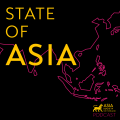
Season 6, Episode 1 – published March 26, 2024
Host/Producer: Remko Tanis, Programs and Editorial Manager, Asia Society Switzerland
Find previous and future episodes here, on Spotify, Apple Podcasts, Google Podcasts, or search for 'State of Asia' in any other podcast app. We're also on YouTube.
Transcript
00:00:03 Remko Tanis
From Asia Society Switzerland, this is State of Asia. My name is Remko Tanis. It's great to kick off another season today of original conversations with leading minds on what's happening in Asia and how it affects us all. And of course, over the next few months, we'll also bring you insights from some of the many events we organize here at Asia Society Switzerland.
00:00:22 Remko Tanis
For example, from the second live edition of our popular series of Oxford Debates, which takes place on April 8 in Zurich and revolves around the motion Asia's rise, will lead to a new world order.
00:00:35 Remko Tanis
I guess we're not exactly shunning the big questions with that one. If you're in Zurich on April 8th, be sure to join us. More info and a link to buy tickets to this debate in the show notes.
00:00:45 Remko Tanis
Today, on State of Asia, we'll look at one of Asia's largest but most unknown countries that is getting itself ready to take up a more prominent place in the region, Mongolia.
00:00:55 Remko Tanis
It's a vibrant democracy, wedged between two of the world's largest authoritarian states, China and Russia. According to my guest, Hong Kong-based Asia correspondent and author Johan Nylander, Mongolia is gearing up to become Asia's next economic miracle.
00:01:09 Remko Tanis
How it aims to achieve that while staying friendly with almost every country it deals with, is the focus of his latest book, The Wolf Economy Awakens. Mongolia's fight for democracy, and a green and digital future, published by Hong Kong University Press. Johan Nylander, welcome to State of Asia.
00:01:26 Johan Nylander
Thank you so much. It's a pleasure to be invited.
00:01:29 Remko Tanis
You're speaking with us from Hong Kong, after quite a few travels, I think to Mongolia writing this book, the Wolf Economy Awakens. I notice in your book you write about how Mongolia is a compelling story for any Asia watcher.
00:01:40 Remko Tanis
Now, plenty of our audience here on the State of Asia podcast consists of Asia watchers. What makes Mongolia a compelling story to them?
00:01:47 Johan Nylander
Well, yeah, that's a quite a big question. I think for a lot of Asia watchers or or for me as an Asia correspondent for Swedish and international media, I think often we focus on like China, India, North and South Korea, Japan.
00:02:00 Johan Nylander
And Mongolia is right off the normal beat, right.
00:02:03 Johan Nylander
Like everybody is interested in the country, but often it's neglected, right? It doesn't get the attention that I think that it's deserves. I've been writing about Mongolia on several occasions but often it's been like indirectly about Mongolia. So for example how does Mongolia's mining industry get affected from slowing demand from China.
00:02:29 Johan Nylander
So in in summer 2022 has started going there more extensively. I started travelling there because there were some things about Mongolia I was very curious about, some things that make Mongolia a bit different to many other countries here in the region and one of the things that I was most curious about is, is that how this small nation landlocked between the world's two biggest authoritarian giants, like with Russia on one side, with China on the other side manages relatively successfully to stand up for democracy and for democratic principles. It's a truly inspiring story, I must say, and I also think it's quite important for readers, for people in the West, in Europe and United States, because sometimes it's a feeling that people in Europe, people in the West, are like, I don't want to exaggerate, but some are losing faith in the democratic system.
00:03:14 Johan Nylander
They feel like the the politicians don't represent me. I don't trust the institutions. That is quite dangerous. You must say, in this democratic societies and and that's why I think that the the case of Mongolia, this small nation, landlocked between Russia and China, still stands up for this democratic principles is very, very important and inspiring story.
00:03:33 Remko Tanis
You speak of how it's inspiring that it's a democratic state between these authoritarian giants, Russia and China. In your book, there's this quote from this 50 year old man, which I found interesting. He says if you speak to the Prime Minister, tell him we're ready for real democracy, we've been waiting for 30 years. So what did he mean by that?
00:03:49 Johan Nylander
Yeah, it's a very good question. I'm happy you picked up on his quote, actually, before my first interview with the Prime Minister, I asked a lot of people, like on the streets, in bars and restaurants, like, what do you think I should ask him?
00:04:01 Johan Nylander
And as in many other democratic system, people didn't hold back in their criticism, and this 50 year old man like he was, he was a bit upset and what he meant by this was that Mongolia was under the thumb. It was a satellite state under the Soviet Union, indirectly controlled by by Moscow for about 100 years. And then when the the fall of the Berlin Wall, the fall of the Soviet empire, Mongolia regained its freedom and its independence. Right. And that happened about 30 years ago. So it's a young democracy, right? And it's not easy going from planned economy to market economy overnight.
00:04:39 Johan Nylander
And from his perspective was like, OK, we have individual freedom, we have economical freedom, but we still have poverty, we have inequality, we have air pollution, we have a lot of negative things in society, and we need a more robust, a more transparent, a stronger democratic society going forward.
00:04:59 Johan Nylander
And this is something I hear from a lot of people like, yeah, we got our independent and has been 30 years of progress, but we need to do better and I hear this not just from from the government but from almost everybody that I speak to, so that that was a frustration in that man's comments.
00:05:09 Remko Tanis
Mongolia is is estimated to be sitting on subsoil riches worth anywhere from one to three trillion U.S. dollars. You point out in the book, that's enough to make every one of the 3.3 million Mongolians a millionaire, potentially, but as this man has said, and as you've seen on the streets, there nearly one in three live in poverty, the GDP per capita has kind of been stuck at about 4000 US dollars over the last decade, while the overall economy is growing due to the these these mining riches that we'll get back to later. I've read in your book that people are concerned about unemployment, the lack of healthcare. What explains this seeming contradiction than of this quicker growing economy with the stagnant poverty level and is the government able to address that? We have elections coming up, if course, in three months in Mongolia.
00:05:50 Johan Nylander
Yes, there's election coming up. It's quite exciting. I mean, this is very important and yeah, Mongolia is, you know, potentially one of the richest countries in the world, but all the riches are underground, right? Mongolia has tons of copper, oil, gold, silver, rare earth metals.
00:06:07 Remko Tanis
All things that go into our mobile phones, our new energy grids, etcetera.
00:06:12 Johan Nylander
Exactly like so. Copper is a key product for green transitions. Rare earth metals naturally for mobile phones, but they're stuck underground. And we had a mining boom in in Mongolia about 10-15 years ago, right?
00:06:27 Johan Nylander
It was the world's fastest growing economy like 1/4 the economy grew by 20%. It was one of the world’s fastest growing economies, right. I remember this story from the Economist saying that like everybody in Mongolia is going to become, you know, dirty, rich. But that didn't happen, right? The mining boom came to an end. The party ended and not enough of the money had been reinvested into future generations, right. The the ground was dug up and sold to China.
00:06:58 Johan Nylander
With too much political infighting, too much corruption and not enough money reinvested in into future generations and new projects. And this means that even if the economy is growing, it doesn't necessarily mean that it is reaching the people in the country.
00:07:11 Johan Nylander
You're like, I mean, what is important is not just economical growth is that it leads to social mobility, right? That you can lift people out of poverty into a middle class. And the country actually failed miserably lifting people into a middle class.
00:07:32 Johan Nylander
So even if the economy like more than tenfold over the last 25-30 years, the number of people stuck in poverty is the same, so that is a great failure and this is something that like both the ruling party in the country is trying to address, this is something that the opposition parties are trying to address and yeah, and going back to that quote from from that 50 year old man like we need stronger democracy, more transparency. Improve the system so more people can be lifted up into a middle class society.
00:07:59 Remko Tanis
Last summer, I ran into the Mongolian band The HU at a festival in Belgium.
00:08:12 Remko Tanis
They were performing in front of at least 10,000 people. They’ve had success touring all over Europe, North America, currently Australia. They describe their music as combining traditional Mongolian throat singing and instruments like the jaw harp, the horsehead fiddle, with screaming guitars we know from from heavy metal.
00:08:32 Remko Tanis
That concert I saw last summer was indeed, mind, if not ear blowing. I was wondering, you spoke with with some of the band members in Ulaanbaatar, the capital of Mongolia. What kind of ambassadors are they for their country you think?
00:08:45 Johan Nylander
The HU? Well, you see, I can put on the vinyl album if you want. Yeah, we can listen instead of talking.
00:08:56 Remko Tanis
Yeah. Well, I don't know if we’d run into copyright issues...
00:08:59 Johan Nylander
I think like after after mining and the livestock. I think The HUis probably the biggest export success ever from Mongolia. I was lucky I was in this jazz club, The Fat Cat Jazz Club in in downtown Ulaanbaatar. Like maybe one of the best jazz clubs I've been to like in my whole life.
00:09:18 Johan Nylander
And there one night I met some of the guys from The HU and we spoke about this Mongolian identity. Right. And this is something that is very close to the heart of many people in Mongolia, when you speak to them how you have like international influences, but you still like, cherish and value deeply your local traditions. And so The HU, as you said like it's a metal band like folk metal band.
00:09:45 Johan Nylander
But with strong connection to the nomadic traditions, to the old nomadic Mongolian culture. Right. So you have all these instruments that you won't see in any other country than in in Mongolia. And this scream you refer to like it's throat singing and it's absolutely amazing. It's one of the best bands I've ever heard.
00:10:05 Johan Nylander
And I think if you want to understand Mongolian identity, go to its music. Like I think The HU is one of the best examples of Western international influences. But you never let go of your local traditions right and this is super important for people in Mongolia. They're strongly connected to their roots.
00:10:24 Remko Tanis
There's another sound from Mongolia I came across after reading your book.
00:10:28 Remko Tanis
And that was the sizzling of meat on giant barbecues, the frying of hundreds of onions, tons of fruit and vegetables that happens daily in the kitchen of the Oyu Tolgoi mine in the South of Mongolia. It's one of the world's largest copper gold mines. It has over 6000 miners who need to be fed every day. And just how this massive kitchen does that is, is is the subject of a film on YouTube that's been by now watched over 7.6 million times.
00:10:51 Remko Tanis
It's quite a Zen experience to watch, I thought, because there's no voice over or commentary, it's just these sounds of tons of vegetables and fruits and meats being prepared, but,
00:11:03 Remko Tanis
more to the point, that mine, the Oyu Tolgoi mine, it's crucial for Mongolia's future, isn't it? And you've you've visited it. What can you tell me about it? How does it feel when you're when you're walking around there?
00:11:14 Johan Nylander
Ohh it's a mind-blowing experience. I mean the Oyu Tolgoi copper mine in the Gobi desert quite close to the Chinese border. The reason I I wrote about the canteen like with 6000, it's the biggest canteen in the whole country, right?
00:11:30 Johan Nylander
he biggest restaurant in the country, 6000 people being fed every day and I mentioned the canteen, yes, to try to explain the sheer size of the mine, right and it'simportant to the whole country's economy. I mean when you stand in this copper mine and you look out of this like moon like stony landscape it's really hard to get your head around it.
00:11:51 Johan Nylander
I mean the the sheer size of it is the area. It’s bigger than Manhattan, right? I know you are in Zurich now. Like the size of the Oyu Tolgoi copper mine is almost as big as all of Zurich. And one kilometer deep. So when you stand there, it's easy to to realize, like how important this mine is for, for the country's economy, right. It accounts for some 4 or 5% of the whole economy.
00:12:17 Johan Nylander
The mine and also how important it is for producing copper that is used for batteries for green transition. Naturally the second thing that is very striking when you stand there is the environmental impact even if this mine is being hailed as one of the the world's most sustainable mines with state-of-the-art engineering you can't help. I've been taken back by witnessing how these deep cuts into the flesh of nature, right? So it's you see how important is for the economy? And you also you can't, like not to worry about the environmental impact of that. It is huge. It's mind blowing big.
00:12:54 Remko Tanis
And you mentioned its importance for the whole economy of Mongolia. That also makes it vulnerable. Of course, the Mongolian economy, if it's so dependent on just one single mine, even though it has potentially much more subsoil riches that are haven't been discovered yet. I heard an interview with the Mongolian Ambassador to Singapore the other day. Who says that only 15% of the country so far has been explored for what's underground, so they've got ways to go.
00:13:18 Remko Tanis
But on the other hand, it makes the country vulnerable to be so dependent on commodities like that. Is it trying to diversify its economy in other ways?
00:13:27 Johan Nylander
Yes, diversifying the economy is very important. Again, you saw the last mining boom 10-15 years ago when they dig up the Earth and sell it to China, there's no value added.
00:13:37 Johan Nylander
If your whole economy is based on selling some resources like copper or gold oil.
00:13:45 Johan Nylander
Your whole GDP will will also fluctuate with the price of of copper. You know copper price goes up, everybody happy. Copper price goes down, everybody being pressed down into poverty. That's naturally not a good business model, not for a company, not for a country. So what the country is trying to do is to diversify the economy and they're trying to do this in two ways.
00:14:05 Johan Nylander
One is within mining because it is a mining-based economy. So you, you dig where you stand, right?
00:14:10 Johan Nylander
Is to increase in the value chain within mining, so to do more added value production in the country. At the moment they are investing in refineries so they are producing oil today and the crude oil is being exported to other countries and they refine it and Mongolia import the refined product back, you know that that's not a very good business model.
00:14:30 Johan Nylander
So instead they want to refine the oil in the country and then export it, like becoming a net exporter. They have copper smelters, they have gold washing plants, so they are
00:14:40 Johan Nylander
a lot of investments now like mega projects like multi, multi billion projects, how to scale up in the value chain, more value added and this is very important and the other one is to diversify into other industries, right, not just be dependent on mining, but all kinds of other industries.
00:15:00 Johan Nylander
And this is very much what my book is about. How they tried to scale up in the technology sector. There’s a thriving, very fascinating tech startup scene. So a lot of especially younger people that don't wanna work in mining, they wanna work in something more international, right. So tech startup.
00:15:15 Johan Nylander
You have lifestyle brands like fashion brands, Skin care brands, jewelry, brands that are connecting with nomadic herders. You have tourism, you have filmmaking, for example. So both diversify in mining, both diversify in in other kinds of industries.
00:15:33 Remko Tanis
I think I mean, many countries say, oh, we're just going to create our version of Silicon Valley and that will help us through the 21st century at least. But reading just the numbers in your book, it seems Mongolia is actually on to something. The country has been rising quickly in international rankings and innovation.
00:15:49 Remko Tanis
I saw 50,000 IT graduates a year on a population of 3.3 million. That's extraordinary. And also it's scored 11th in the International Math Olympiad, ahead of Finland and Norway, and up from the 50th place only 14-15 years ago. Is that deliberate policy by the Mongolian government? Is the education system completely geared to getting
00:16:09 Remko Tanis
people into this IT sector and make that a successful export product as well for for the country?
00:16:13 Johan Nylander
Yeah. I think the push into technology and digitalization is a new thing, right? It hasn't been around for a long time, but it's, but it's really gaining ground. There's a quick, fast digitalization of the nation, and I mean in terms of scoring high in mathematics, that's something you see in, in the whole region, right? They put a lot of emphasis on engineering, mathematics, coding like more than in Europe and America.
00:16:38 Johan Nylander
And that's something you see like here in Hong Kong, Singapore, China and Japan. So it kind of follows an Asian trend, I would say, which is I I really think that Europe should take inspiration from. But now you see a lot of fascinating technology companies coming out of Mongolia,
00:16:53 Johan Nylander
who are addressing local problems that can have international wings like they, they can be exported to other countries and you see this in green technology like climate tech. So yeah, I think it's a lot of fascinating things. I have been covering the technology sector in Hong Kong in Shenzhen, in Ho Chi Minh City,
00:17:13 Johan Nylander
Jakarta, Seoul, Tokyo.
00:17:15 Johan Nylander
And Ulaanbaatar is one of those places that actually inspires me that I find fascinating.
00:17:21 Remko Tanis
You write about it in the book, seeing nomadic herders just living in these far stretches of empty land. But now all of a sudden being able to use drones or to just use their smartphones to access government services. How did that impact these nomads themselves? How did they feel about that?
00:17:35 Johan Nylander
Hmm.
00:17:36 Johan Nylander
Well, it's it's a very good question and how the modern technology digitisation is affecting this tradition, this traditional way of life. I mean, you can look at it from both sides, right? I mean, we all know how great and damaging modern technology,
00:17:49 Johan Nylander
you know how overwhelmed we can be with these notifications and you know, scrolling, scrolling on the Instagram feeds, right? There's a calm quietness being out in the countryside not having access to this. But I think that that's also a bit of a tourist dream. I think the experience I had when I spoke to
00:18:10 Johan Nylander
the herders, to the nomads, is that it simplifies life for them tremendously. You have this like e-Mongolian app for example, where you can apply for a new a new passport, apply for driving license,
00:18:22 Johan Nylander
you can do your tax filings, everything in one app, like there's no equivalent in Sweden or other European countries whatever I know about where you can have one app for everything connected to government. You can see like herders riding on a horse or a camel sitting with their mobile phones and actually doing government e-services. And this makes life easier for them. Also, if you don't have access to international information, you don't know what the price
00:18:45 Johan Nylander
is for different things, right? So you have to trust agents. For example, if you wanna sell milk, you wanna sell meat. You wanna sell this and that? Like now they can know what is the current spot price. So they're closer to international markets.
00:19:00 Johan Nylander
So they say by by using this technology that it makes it easier for them to maintain the traditional lifestyle and modern technology brings them closer to the traditional nomadic lifestyle. And that's quite inspiring. Again like I have like a full chapter just about this in the book. And I think it's my favorite part of the book actually.
00:19:19 Remko Tanis
I also noticed the green technology like the solar powered heating devices that they use in the yurt and this one family you visited and the mother of family said, well, now we don't have to argue about each morning about who has to get up earlier to to fire up the coal, etc. We can just switch on this solar panel thing and the tent can gets warm. It was a really, really good example. I thought of the impact of this new technology.
00:19:41 Johan Nylander
Yeah, that is one of my, again, I think that was also very interesting story is this Mongolian company called Eureka and they are helping people in the most poor part of Ulaanbaatar to change from coal because in the winter it it gets down to -40°C.
00:19:59 Johan Nylander
So they burn coal to to heat their homes. And this company, they are helping them to transition from coal to solar panels. That naturally comes with a cost. So what they're doing which is key to this is that they're connecting this transition from burning coal to solar panel with carbon credit systems. So the family can
00:20:19 Johan Nylander
take advantage of this carbon credit system and make money right and they can make almost as much as one person's minimum wage per year. So it's almost like having one more person working for the household. So they make quite good money from it, from the carbon credits.
00:20:34 Johan Nylander
And also as you said that they don't have to breathe this toxic air and the family, they don't have to fight in the morning whose turn is it to go up and get your hands black and dirty from burning cold. And I think this is one of those Mongolian solutions that could have impact globally also.
00:20:51 Remko Tanis
We touched upon it briefly at the beginning of our conversation, how Mongolia is this democratic state wedged between China and Russia.
00:20:58 Remko Tanis
I was wondering it has of course economic ties with Russia and China. It has this economic corridor with both countries that involves rail, roads, electric grid, pipelines. So it has every interest not to offend either one of the countries. At the same time, it's getting a lot of attention from the West. Recently, last year, we saw the Presidents of France and Poland visit.
00:21:20 Remko Tanis
Even the Pope visiting the 1500 registered Catholics in the country earlier this year, the German president hopped over. How is Mongolia positioning itself on this geopolitical stage that especially in the region it's in, is changing?
00:21:33 Johan Nylander
So quickly, Mongolia's diplomatic relationship with the world is quite unique. Because Mongolia they have, again, they are very good diplomatic and business connection both with Russia and China right then, and naturally they don't really have a choice because they're landlocked between these two ctountries. But they also have very good diplomatic connections with United States, Europe, Japan, South Korea, India and this is called the third neighbor policy.
00:21:57 Johan Nylander
So you have Russia, China, and your third neighbor, which is the rest of the world, often the democratic part of the world.
00:22:04 Johan Nylander
And this unique position, I mean some people call Mongolia the Switzerland of of Asia. It has this neutrality, people from Russia, people from China and Japan and United States they can meet in Mongolia. There's something called the Ulaanbaatar dialogue. So people from all these countries can come to Mongolia and debate security.
00:22:24 Johan Nylander
An economy in the region and actually now when there's so much tensions in the world, right. You have the tension between Russia and the EU, China and the United States. All the war in the Middle East is so much tension in the world now and I think that Mongolia could potentially play a role as a mediator and Mongolia have done this.
00:22:47 Johan Nylander
Before, I mean a good example is that North Korea and Japan, they don't have any official diplomatic relationships, but lower level diplomats from North Korea and from Japan, they can come to Ulaanbaatar and unofficially discuss this, like burning issues. Again when when Donald Trump, when he met with North Korea's leader, Kim Jong-Un,
00:23:07 Johan Nylander
Ulaanbaatar was shortlisted as one of the places they could meet.
00:23:10 Johan Nylander
In the end, it happened in Singapore and people say maybe because they have better golf courses. I think Mongolia, they have a unique diplomatic position and I think this could be used. The Mongolian Government should probably press harder to try to be a mediator now, and the world is facing so many difficulties.
00:23:30 Remko Tanis
Is one of the ways Mongolia is keeping its direct neighbours and its third neighbors happy by just involving them as well? In giant mega projects in the country, India is building the first oil refinery in or financing the first oil refinery in Mongolia, Russia, building pipelines. I believe you have China building a hydro dam at the same time.
00:23:50 Remko Tanis
Not not too long ago, 2-3 years ago, Mongolia concluded its first free trade agreement with Japan. It really seems to be able to get the best from every side.
00:24:00 Johan Nylander
Yeah, I think you're right. Actually they have to be careful, Mongolia, not to upset its closest neighbors, closest trade partners. But I don't know, it's something people just like Mongolia. I mean United States, the former Secretary of State John Kerry visit Mongolia and called it an oasis of democracy.
00:24:20 Johan Nylander
You speak with the World Bank and United Nations, and like ambassadors from different countries and and they speak so warmly about this, this country, something with the country and it's it's.
00:24:29 Johan Nylander
Political approach that is just likeable and also this huge business opportunities like untapped business opportunities. So strong diplomatic relationships and huge business opportunities it's a quite good combination to make friends.
00:24:42 Remko Tanis
You're writing in your book how the country is applauded by many diplomats, trade envoys, development bankers, investors. I was wondering, how do you convince just a European tourist who feels like going to Asia for the annual holiday to skip Thailand for once and go to Ulaanbaatar?
00:24:58 Johan Nylander
Well, if you like -40, Ulaanbaater is the place to be.
00:25:01 Remko Tanis
All right.
00:25:02 Johan Nylander
No, but, yeah, I mean it's hard to compare Thailand with Mongolia, but Mongolia it is one of the most beautiful countries I've been to in my life. It's it. It's probably the the friendliest, most welcoming people I've ever met and I mean downtown Ulaanbaatar it's a proper modern international city, you know, nightclubs, jazz clubs, international restaurants, but the real adventure starts when you leave the capital and go out on the countryside when you take a Jeep with a driver out on the steppes. I mean there are no roads. You basically drive just through the grassland, wherever you drive you see this like wild horses running free. You see you see cattle yaks.
00:25:45 Johan Nylander
It's absolutely fantastic and you can drive up to almost any yurt, these nomadic families and they will welcome you home. Maybe you bring a bottle of vodka or some, you know, pencils and books for the kids. But they will welcome you in and you can stay the night. It's I don't want to sound like a cliche but it's very much an inner travel.
00:26:04 Johan Nylander
It is extraordinary beautiful, and I remember waking up when I stayed with the herders, right. And you wake up early in the morning when the sun is just rising on the steppe plans and you realise what they mean with like the endless blue sky like the world seems so big and so simple. And so beautiful. And it's really tremendously beautiful.
00:26:24 Johan Nylander
Eventually go to Mongolia. Just do it. You will never regret it.
00:26:27 Remko Tanis
Your book is called The Wolf Economy Awakens.
00:26:29 Remko Tanis
Where does that term come from?
00:26:30 Johan Nylander
You heard the expression the tiger economies like Hong Kong, Taiwan, Singapore. But Mongolia, it's not a tiger country, right? It's a wolf country. Like the wolf is considered like almost a holy animal. Like a spirit. And it's a rougher kind of economy, like mining and and herding. Right. So they started to call it the wolf economy and now like you, had this 30 years, and now what's gonna happen the next 30 years like, and I think it's the wolf economy is gonna awaken like we're gonna see a investments and business opportunities here. That is where the wolf economy comes from.
00:27:04 Remko Tanis
Excellent. Thank you very much, Johan. The book is the Wolf Economy Awakens. More info on the site, and great photos as well, Wolf Economy dot Asia. Thanks again for this conversation. Thank you.
00:27:14 Johan Nylander
Yeah. Thank you so much. It's my pleasure. And I'll see you in Mongolia, OK.
00:27:18 Remko Tanis
Yeah, in the summer is fine.
00:27:20 Johan Nylander
In the summer. OK. All right, all right.
More Episodes
-
podcast
-
podcast
